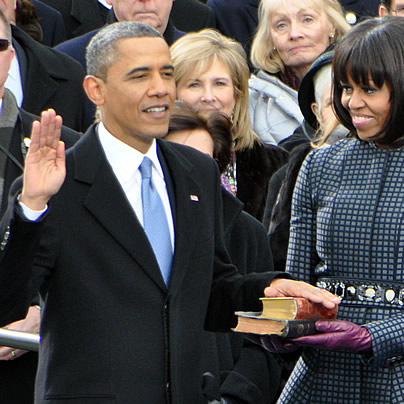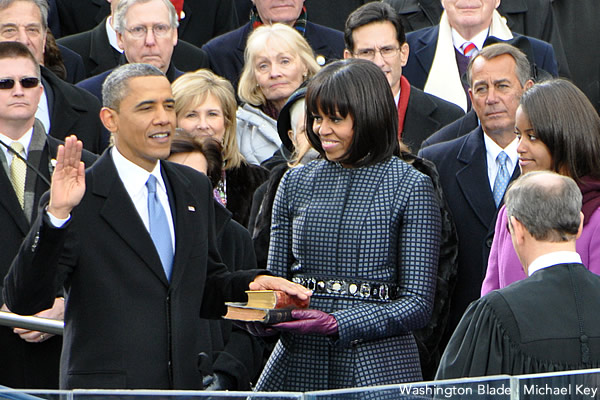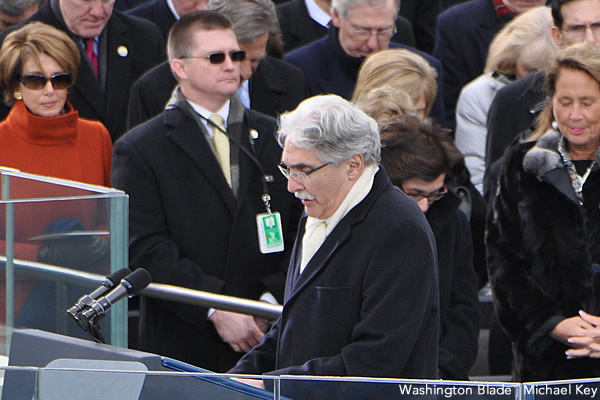National
Obama makes history at start of second term
In first, president includes gay references in address


President Obama made history by including gays and lesbians in his 2013 inaugural address in two references. (Washington Blade photo by Michael Key)
Marking the official start of his second term, President Obama on Monday included for the first-time ever explicit references to the LGBT community in a presidential inaugural speech — a powerful statement because of the symbolic nature of the widely watched speech as a reflection of the American spirit.
Following his swearing-in by Chief Justice of the U.S. Supreme Court John Roberts, Obama delivered the speech, which included many nods to his progressive base, including mentions of climate change, immigration reform in addition to a reaffirmation of the president’s earlier stated support for marriage equality.
“Our journey is not complete until our gay brothers and sisters are treated like anyone else under the law – for if we are truly created equal, then surely the love we commit to one another must be equal as well,” Obama said.
Obama made another reference to the LGBT community when he included a mention of the 1969 Stonewall riots in New York City, which are seen as the start of the modern LGBT rights movement.
“We, the people, declare today that the most evident of truths – that all of us are created equal – is the star that guides us still; just as it guided our forebears through Seneca Falls, and Selma, and Stonewall; just as it guided all those men and women, sung and unsung, who left footprints along this great Mall, to hear a preacher say that we cannot walk alone; to hear a King proclaim that our individual freedom is inextricably bound to the freedom of every soul on Earth,” Obama said.

(Washington Blade photo by Michael Key)
An estimated crowd of at least 500,000 filled the National Mall to hear Obama’s speech. Spectators were bundled in coats and hats as they braved the cold winter temperatures. Still, the weather was more forgiving than during Obama’s 2009 inauguration in which bitter cold chilled those in attendance to the bone.
One LGBT advocate in attendance was Brenda “Sue” Fulton, a lesbian who serves on the board of the LGBT military group OutServe-SLDN. The newly married graduate of the U.S. Military Academy at West Point said she was quite moved by Obama’s LGBT inclusion in the speech.
“When he went on to talk about marriage equality for ‘our gay brothers and sisters,’ four lovely young men in front of us cheered at the top of their lungs,” Fulton said. “I admit that I teared up. We’ve come so far this past four years; I can see all those young people in military uniforms on the platform and all around, and know that not only are some of them gay, but the others know it, and support them.”
Mentions of the LGBT community were part of a larger message in which Obama chose to set the tone for his second term by recalling past challenges the nation has overcome and issuing a call to come together to face the challenges of the present day.
“But we have always understood that when times change, so must we; that fidelity to our founding principles requires new responses to new challenges; that preserving our individual freedoms ultimately requires collective action,” Obama said. “Now, more than ever, we must do these things together, as one nation, and one people.”
No previous president has mentioned LGBT people during an inaugural address. In 2009, Obama didn’t mention the LGBT community despite promising a commitment to LGBT rights over the course of his first presidential campaign. Instead, Obama at the time made a reference to civil rights in general, saying the nation has “tasted the bitter swill of civil war and segregation” and “as the world grows smaller, our common humanity shall reveal itself.”
John Aravosis, editor of AMERICAblog, said he was “impressed” with the way Obama reaffirmed support for the LGBT community and said it could have an impact on the gay-related cases to come before the U.S. Supreme Court.
“In addition to mentioning marriage equality, an African-American president put Stonewall alongside Selma in one of the most important speeches of his presidency,” Aravosis said. “I think that’s hugely significant culturally and politically, and possibly legally as well – the Supreme Court was sitting right there, and they look to the culture and politics when considering decisions on major social issues, like the upcoming marriage cases. This didn’t hurt.”
But LGBT-inclusiveness at the celebration wasn’t just limited to mentions in the widely anticipated speech. Those who attended on the inaugural platform as Obama was sworn into office and delivered his speech included high-profile members of the LGBT community such as Human Rights Campaign President Chad Griffin and Rev. Gene Robinson, the first openly gay bishop consecrated in the Episcopal Church.
“Today, the POTUS moved beyond merely mentioning the existence of our community, to express his commitment to our full citizenship and respect for our love,” Robinson said. “There is no way to overstate the importance of his words and witness to our lives and our love. No, we haven’t ‘arrived,’ but we sure have come a long way down this road! Amazing!”
Other speakers at the event made were gay-affirming in one way or another. The pastor who delivered the closing benediction for the service, Rev. Luis Leon, an Episcopal priest with the D.C.-based St. John’s Church, called for a blessing on all people — including whether they be “gay or straight” — in his closing remarks.

Rev. Luis Leon (Washington Blade photo by Michael Key)
“With the blessing of your blessing we will see that we are created in your image, whether brown, black or white, male or female, first generation or immigrant American, or daughter of the American Revolution, gay or straight, rich or poor,” said León.
Leon, who also delivered the benediction at former President George W. Bush’s inaugural in 2005, was a replacement for Pastor Louie Giglio of the Georgia-based Passion City Church, who withdrew from the role after the blog ThinkProgress revealed that he delivered a virulently anti-gay sermon in the 1990s. In contrast, Leon was one of the religious figures who helped in the 2009 push to legalize same-sex marriage in D.C.
Gay inclusion during the festivities also came in the form of the openly gay inaugural poet — the nationally acclaimed Richard Blanco — who recited a poem titled, “One Today,” which highlights unity despite differences among individuals in America.
“All of us as vital as the one light we move through, the same light on blackboards with lessons for the day: equations to solve, history to question, or atoms imagined, the ‘I have a dream’ we keep dreaming, or the impossible vocabulary of sorrow that won’t explain the empty desks of twenty children marked absent today, and forever,” Blanco read.
In a statement, HRC’s Griffin commended Obama for the LGBT-inclusion in his speech and emphasized the importance of sending such a message in an inaugural address. HRC didn’t immediately respond to a follow-up request for comment on whether the organization helped Obama with the LGBT portions of the speech.
“By lifting up the lives of LGBT families for the very first time in an inaugural address, President Obama sent a clear message to LGBT young people from the Gulf Coast to the Rocky Mountains that this country’s leaders will fight for them until equality is the law of the land,” Griffin said. “As the merits of marriage equality come up for debate from state houses to the halls of the U.S. Supreme Court, and a broad majority of Americans are standing up for liberty and fairness, the President’s unequivocal support for equality is a clarion call that all Americans should receive with celebration.”
U.S. Supreme Court
Supreme Court to consider bans on trans athletes in school sports
27 states have passed laws limiting participation in athletics programs

The U.S. Supreme Court on Thursday agreed to hear two cases involving transgender youth challenging bans prohibiting them from participating in school sports.
In Little v. Hecox, plaintiffs represented by the ACLU, Legal Voice, and the law firm Cooley are challenging Idaho’s 2020 ban, which requires sex testing to adjudicate questions of an athlete’s eligibility.
The 9th U.S. Circuit Court of Appeals described the process in a 2023 decision halting the policy’s enforcement pending an outcome in the litigation. The “sex dispute verification process, whereby any individual can ‘dispute’ the sex of any female student athlete in the state of Idaho,” the court wrote, would “require her to undergo intrusive medical procedures to verify her sex, including gynecological exams.”
In West Virginia v. B.P.J., Lambda Legal, the ACLU, the ACLU of West Virginia, and Cooley are representing a trans middle school student challenging the Mountain State’s 2021 ban on trans athletes.
The plaintiff was participating in cross country when the law was passed, taking puberty blockers that would have significantly reduced the chances that she could have a physiological advantage over cisgender peers.
“Like any other educational program, school athletic programs should be accessible for everyone regardless of their sex or transgender status,” said Joshua Block, senior counsel for the ACLU’s LGBTQ and HIV Project. “Trans kids play sports for the same reasons their peers do — to learn perseverance, dedication, teamwork, and to simply have fun with their friends,” Block said.
He added, “Categorically excluding kids from school sports just because they are transgender will only make our schools less safe and more hurtful places for all youth. We believe the lower courts were right to block these discriminatory laws, and we will continue to defend the freedom of all kids to play.”
“Our client just wants to play sports with her friends and peers,” said Lambda Legal Senior Counsel Tara Borelli. “Everyone understands the value of participating in team athletics, for fitness, leadership, socialization, and myriad other benefits.”
Borelli continued, “The U.S. Court of Appeals for the Fourth Circuit last April issued a thoughtful and thorough ruling allowing B.P.J. to continue participating in track events. That well-reasoned decision should stand the test of time, and we stand ready to defend it.”
Shortly after taking control of both legislative chambers, Republican members of Congress tried — unsuccessfully — to pass a national ban like those now enforced in 27 states since 2020.
Federal Government
UPenn erases Lia Thomas’s records as part of settlement with White House
University agreed to ban trans women from women’s sports teams

In a settlement with the Trump-Vance administration announced on Tuesday, the University of Pennsylvania will ban transgender athletes from competing and erase swimming records set by transgender former student Lia Thomas.
The U.S. Department of Education’s Office for Civil Rights found the university in violation of Title IX, the federal rights law barring sex based discrimination in educational institutions, by “permitting males to compete in women’s intercollegiate athletics and to occupy women-only intimate facilities.”
The statement issued by University of Pennsylvania President J. Larry Jameson highlighted how the law’s interpretation was changed substantially under President Donald Trump’s second term.
“The Department of Education OCR investigated the participation of one transgender athlete on the women’s swimming team three years ago, during the 2021-2022 swim season,” he wrote. “At that time, Penn was in compliance with NCAA eligibility rules and Title IX as then interpreted.”
Jameson continued, “Penn has always followed — and continues to follow — Title IX and the applicable policy of the NCAA regarding transgender athletes. NCAA eligibility rules changed in February 2025 with Executive Orders 14168 and 14201 and Penn will continue to adhere to these new rules.”
Writing that “we acknowledge that some student-athletes were disadvantaged by these rules” in place while Thomas was allowed to compete, the university president added, “We recognize this and will apologize to those who experienced a competitive disadvantage or experienced anxiety because of the policies in effect at the time.”
“Today’s resolution agreement with UPenn is yet another example of the Trump effect in action,” Education Secretary Linda McMahon said in a statement. “Thanks to the leadership of President Trump, UPenn has agreed both to apologize for its past Title IX violations and to ensure that women’s sports are protected at the university for future generations of female athletes.”
Under former President Joe Biden, the department’s Office of Civil Rights sought to protect against anti-LGBTQ discrimination in education, bringing investigations and enforcement actions in cases where school officials might, for example, require trans students to use restrooms and facilities consistent with their birth sex or fail to respond to peer harassment over their gender identity.
Much of the legal reasoning behind the Biden-Harris administration’s positions extended from the 2020 U.S. Supreme Court case Bostock v. Clayton County, which found that sex-based discrimination includes that which is based on sexual orientation or gender identity under Title VII rules covering employment practices.
The Trump-Vance administration last week put the state of California on notice that its trans athlete policies were, or once were, in violation of Title IX, which comes amid the ongoing battle with Maine over the same issue.
New York
Two teens shot steps from Stonewall Inn after NYC Pride parade
One of the victims remains in critical condition

On Sunday night, following the annual NYC Pride March, two girls were shot in Sheridan Square, feet away from the historic Stonewall Inn.
According to an NYPD report, the two girls, aged 16 and 17, were shot around 10:15 p.m. as Pride festivities began to wind down. The 16-year-old was struck in the head and, according to police sources, is said to be in critical condition, while the 17-year-old was said to be in stable condition.
The Washington Blade confirmed with the NYPD the details from the police reports and learned no arrests had been made as of noon Monday.
The shooting took place in the Greenwich Village neighborhood of Manhattan, mere feet away from the most famous gay bar in the city — if not the world — the Stonewall Inn. Earlier that day, hundreds of thousands of people marched down Christopher Street to celebrate 55 years of LGBTQ people standing up for their rights.
In June 1969, after police raided the Stonewall Inn, members of the LGBTQ community pushed back, sparking what became known as the Stonewall riots. Over the course of two days, LGBTQ New Yorkers protested the discriminatory policing of queer spaces across the city and mobilized to speak out — and throw bottles if need be — at officers attempting to suppress their existence.
The following year, LGBTQ people returned to the Stonewall Inn and marched through the same streets where queer New Yorkers had been arrested, marking the first “Gay Pride March” in history and declaring that LGBTQ people were not going anywhere.
New York State Assemblywoman Deborah Glick, whose district includes Greenwich Village, took to social media to comment on the shooting.
“After decades of peaceful Pride celebrations — this year gun fire and two people shot near the Stonewall Inn is a reminder that gun violence is everywhere,” the lesbian lawmaker said on X. “Guns are a problem despite the NRA BS.”
-

 U.S. Supreme Court2 days ago
U.S. Supreme Court2 days agoSupreme Court to consider bans on trans athletes in school sports
-

 Out & About2 days ago
Out & About2 days agoCelebrate the Fourth of July the gay way!
-

 Virginia2 days ago
Virginia2 days agoVa. court allows conversion therapy despite law banning it
-

 Maryland4 days ago
Maryland4 days agoLGBTQ suicide prevention hotline option is going away. Here’s where else to go in Md.










